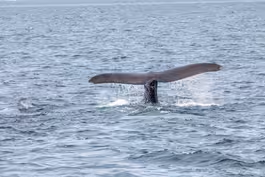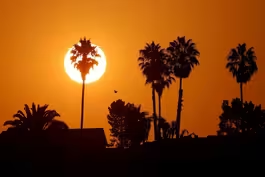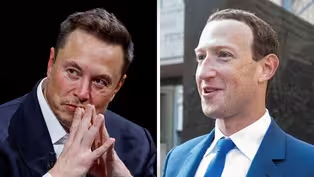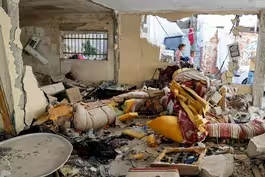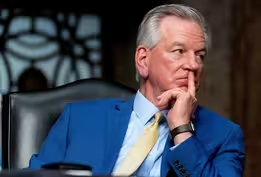
Ukrainian mothers take extreme measures to rescue children
Clip: 7/6/2023 | 11m 21sVideo has Closed Captions
Ukrainian mothers take extreme measures to rescue kidnapped children
Since the start of Russia's invasion, nearly 20,000 Ukrainian children have been transferred to Russia or Russian-controlled territories. With the support of the Pulitzer Center, producer and filmmaker Amanda Bailly, producer Anton Shtuka and special correspondent Jane Ferguson report on the journey of fierce mothers and grandmothers determined to find their children.
Problems playing video? | Closed Captioning Feedback
Problems playing video? | Closed Captioning Feedback
Major corporate funding for the PBS News Hour is provided by BDO, BNSF, Consumer Cellular, American Cruise Lines, and Raymond James. Funding for the PBS NewsHour Weekend is provided by...

Ukrainian mothers take extreme measures to rescue children
Clip: 7/6/2023 | 11m 21sVideo has Closed Captions
Since the start of Russia's invasion, nearly 20,000 Ukrainian children have been transferred to Russia or Russian-controlled territories. With the support of the Pulitzer Center, producer and filmmaker Amanda Bailly, producer Anton Shtuka and special correspondent Jane Ferguson report on the journey of fierce mothers and grandmothers determined to find their children.
Problems playing video? | Closed Captioning Feedback
How to Watch PBS News Hour
PBS News Hour is available to stream on pbs.org and the free PBS App, available on iPhone, Apple TV, Android TV, Android smartphones, Amazon Fire TV, Amazon Fire Tablet, Roku, Samsung Smart TV, and Vizio.
Providing Support for PBS.org
Learn Moreabout PBS online sponsorshipAMNA NAWAZ: Nearly 20,000 Ukrainian children have been unlawfully transferred to Russia or Russian-controlled territories of Ukraine since the war began nearly a year-and-a-half ago.
International arrest warrants have been issued for Russian President Vladimir Putin and another member of his government for those crimes, but mothers and grandmothers have also taken matters into their own hands.
With the support of the Pulitzer Center, filmmakers Amanda Bailly and Anton Shtuka bring us the stories of the fierce women who went to take back their children.
Special correspondent Jane Ferguson narrates their journey.
JANE FERGUSON: Of all the civilians to pass through Kyiv train station in this war, few have more at stake than these women.
They have just arrived from areas in Ukraine once occupied by Russian forces.
They are on a journey to get their children back.
JANNA, Ukrainian Mother (through translator): I haven't seen my daughter for more than five months, since the children were sent to the camp.
My only dream is to spend time with her, cherish her, love her, protect her.
JANE FERGUSON: Each woman on this bus has a similar story.
They bond quickly, having shared the same horror.
Now they share the same mission.
Janna's daughter Masha is in the Russian-controlled Ukrainian territory of Crimea.
Masha is a vibrant, sporty 13-year-old.
When the Russian forces took over their home city, Kherson, just to the north of Crimea, Masha's school told Janna the area was not safe for children due to Ukrainian shelling.
They planned to move the kids to facilities that were summer campgrounds for Ukrainian children before the war, only, those camps were in areas now controlled by Russian military.
JANNA (through translator): They sent her to Mechta camp in Yevpatoriya, Crimea.
Masha is very good-natured and affectionate, but she's a fighter.
She's a professional-level karate fighter.
My girl is very active and sociable, loves playing with children and babies, and loves to spend time with her friends.
JANE FERGUSON: Janna says the authorities at Masha's school pressured her to send Masha, promising her in writing she would be back in two weeks.
JANNA (through translator): They offered it for safety reasons.
They told us that fighting in the city would start soon, and it would not be safe for children to be in the city, and that schools are shelled by the armed forces of Ukraine.
So we were offered to send them to Crimea so that the children could rest and continue school.
They promised to bring the children back in two weeks.
Well, no one brought anyone back.
JANE FERGUSON: Janna said the Russian authorities told parents, after one month, they could come and collect their children, but would have to stay in Russian-controlled territory with them.
But crossing the front lines and returning is near impossible.
At the same time, the Russian authorities were easing regulations for Russian families to adopt deported Ukrainian children like Masha and raise them as Russians.
Ukraine says at least 19,000 Ukrainian children were moved by the Russian military and collaborators into Russian-controlled territories since the war began.
Natalia is from Kupiansk in the east.
When Russian soldiers and local collaborators retreated from the town, to her horror, they took her 15-year-old son, Artem, with them.
NATALIA, Ukrainian Mother (through translator): On September 7, he went to school.
He stayed the night at the school, as there was no bus home in the evening.
And in the morning, those people, I don't know how to call them, took kids with them when they were running away from Kupiansk.
They took 13 kids with them.
How did this happen?
And we had no electricity and mobile connection at that time.
We were looking for him.
We were in a panic.
JANE FERGUSON: Artem was taken to a school in Luhansk, a Russian-controlled area in Ukraine.
After a month with no word, he was finally able to make contact with his terrified mother.
NATALIA (through translator): It's good that Artem knew my number from memory, and he took a phone from the principal of the school where he is now, called me on WhatsApp, and told me where he was and what happened.
I have been waiting for half-a-year now.
JANE FERGUSON: As days turned to weeks, then months, it became increasingly clear the children had been taken for good.
NATALIA (through translator): These last months were shocking.
I can't think about anything, can't do anything.
Well, there is a mess in my head.
All kinds of thoughts in my mind.
Artem called and said they were told that, if there is combat activity there too, they will be taken to Russia.
And they also had air raid alerts and incoming strikes.
And they were told that, if it gets dangerous there, they will be taken to Russia.
I got into a panic again.
JANE FERGUSON: Once in Kyiv, they overnight, preparing themselves for the long trip ahead into Russian and Russian-held territory.
Their journey is being organized by Save Ukraine, a charity creating a network of allies for the women inside countries and territories where their children are held and from where they need to be saved.
Save Ukraine is the only organization offering real, tangible help to these women.
Myroslava Kharchenko, a lawyer working with Save Ukraine, preps the women for what's ahead.
Most of these women have never been abroad before.
MYROSLAVA KHARCHENKO, Attorney, Save Ukraine (through translator): The main rule is to listen to the drivers.
They know what to say.
Different borders, they pass differently.
It will not be easy.
It will be a very long journey and stressful.
You will be going through different countries and will spend time in the country of your aggressor.
Memorize your driver's phone number, because anything could happen.
JANE FERGUSON: Journalists Amanda Bailly and Anton Shtuka were able to exclusively travel with the mothers for part of the journey as they embarked on the mission to bring home their children.
Most of the women had been able to make patchy contact with their children in recent days, preparing them and telling them to be ready to leave soon.
Svetlana is grandmother and guardian to 13-year-old Nastya.
She joins Natalia and Janna on the journey, telling her granddaughter she is on her way.
SVETLANA, Ukrainian Mother (through translator): I talked to Nastya.
She was delighted, she broke into tears, and I heard her voice and started crying.
I said: "Nastya, it's you, I'm so happy to hear you.
I'm really excited.
I am going for you.
You wait."
She said: "OK. Granny, I'm waiting for you, I'm packing my suitcase now."
And she was crying.
I hadn't heard her voice in a long time.
JANE FERGUSON: On the journey, people on the inside will help them make their way to their children, a network of allies working with Save Ukraine, and providing logistics, perhaps parents themselves.
JANNA (through translator): We are so grateful to the people who help bring back Ukrainian children from these foreign territories.
Our deepest gratitude to them.
Perhaps we would not see our children again without their help.
JANE FERGUSON: As they set off, the women are hopeful.
In each of their minds, they dream of what they will do when they see their children again, and the lives they will try to give them after the war.
JANNA (through translator): First, I will not let her go.
I will kiss and hug her.
I will apologize for letting her go there, for letting her be in such an environment.
And then I will cook something delicious, like her favorite cake, and I will buy her lots of chocolates.
And, later, when she recovers a little, I will play sports with her.
We will ride bicycles and lead an active life, like we used to before the war.
SVETLANA (through translator): I have always believed it.
Yes, I was afraid that I might lose her.
Nevertheless, I had hope, hope that I would get her back.
And I prayed every day.
I prayed every night.
And I had a hope that, sooner or later, I would see the child at home.
NATALIA (through translator): I will just hug him.
I just want him to be with me, nothing else.
I don't want anything else.
The most important thing is to take him back.
And that's it.
We will celebrate when the war is over.
Now it is not the best time for celebrations.
I want him by my side.
JANE FERGUSON: The journey is a long one, from Kyiv to Chelm in Poland by train, from Chelm to Minsk City in Belarus by bus.
From Minsk, they fly to Moscow.
From there, they travel by bus and car to Russian-controlled areas of Ukraine.
Music has always played here on loudspeakers.
This evening, it is a famous song about returning to mothers.
As they set off, journalists could not follow them on that journey, but along the way the mothers would film themselves where they could and when it was safe.
Finally, they make it here.
This is the campground in Russian-occupied Crimea where their children are being held.
It appears there are no Russian military present, just civilians working there.
The children come running to their mothers they have not seen in months.
They were handed back to the mothers without resistance.
After months of cautious self-preservation came waves of emotion.
For these women, as with mothers across the world, there is no distance they would not travel to find their children and bring them home.
For the "PBS NewsHour," I'm Jane Ferguson.
AMNA NAWAZ: Tune in tomorrow for Jane's second report on how those rescued children are readjusting to life back at home in a war zone.
Blood test can identify risk for preeclampsia
Video has Closed Captions
Clip: 7/6/2023 | 5m 28s | Blood test can identify risk for preeclampsia, the leading cause of maternal death (5m 28s)
Conservationists fight to save Northern Atlantic right whale
Video has Closed Captions
Clip: 7/6/2023 | 7m 19s | Conservationists fight to save Northern Atlantic right whales from extinction (7m 19s)
Hottest global temperature highlights climate change effects
Video has Closed Captions
Clip: 7/6/2023 | 5m 54s | Record-breaking global temperature, raging wildfires highlight effects of climate change (5m 54s)
Meta launches Twitter competitor as rivalry intensifies
Video has Closed Captions
Clip: 7/6/2023 | 5m 10s | Meta launches Twitter competitor Threads as Zuckerberg and Musk rivalry intensifies (5m 10s)
Palestinians in Jenin begin recovery after Israeli operation
Video has Closed Captions
Clip: 7/6/2023 | 7m 30s | Palestinians in West Bank struggle to recover after intense Israeli military operation (7m 30s)
Sen Tuberville blocks military nominees over abortion policy
Video has Closed Captions
Clip: 7/6/2023 | 5m 55s | Military leadership positions unfilled as GOP senator blocks nominees over abortion policy (5m 55s)
Providing Support for PBS.org
Learn Moreabout PBS online sponsorship
- News and Public Affairs

FRONTLINE is investigative journalism that questions, explains and changes our world.

- News and Public Affairs

Amanpour and Company features conversations with leaders and decision makers.












Support for PBS provided by:
Major corporate funding for the PBS News Hour is provided by BDO, BNSF, Consumer Cellular, American Cruise Lines, and Raymond James. Funding for the PBS NewsHour Weekend is provided by...

